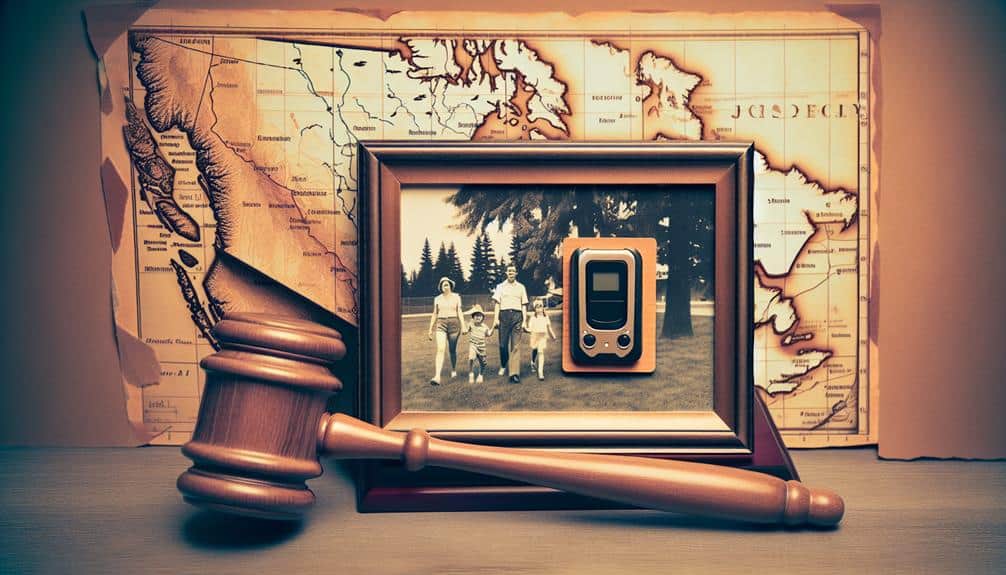
In the realm of British Columbia family law, the use and admissibility of covertly obtained audio or video recordings have become a point of contention and legal dilemma.
While such recordings may seemingly offer undeniable evidence in sensitive cases, they often raise significant ethical considerations and potential breaches of privacy.
The issue becomes more convoluted when the potential prejudicial impact of these recordings is weighed against their probative value.
The probative value of evidence is the determination of how helpful it is at proving the fact at issue – for example if the issue were proving identification, a DNA sample would have more probative value than a hair sample, though both may be helpful. Reliability is a driving concern when considering probative value.
On the other hand, the prejudicial impact of evidence is, essentially, how much consideration of that evidence prevents the court from maintaining a fair trial. Prejudice is not considered in terms of how it relates to an actor in the trial – either party in a family law trial, for instance. For example, evidence can have an unduly prejudicial impact when it requires excessive time, which in the law usually also means money, to consider.
Additionally, the legality of such recordings under Section 184 of the Canadian Criminal Code further complicates matters.
The following discussion aims to make clear the implications, legal position, and potential fallout of using such secret recordings in BC family law, thereby prompting a thorough exploration of this complex and multifaceted topic.
Key Takeaways
- Secret recordings in family law proceedings are generally discouraged and may have limited weight or importance in court.
- Increasing conflict and reducing trust are negative consequences of using secret recordings as evidence.
- The children’s best interests should be prioritized in high-conflict family law matters, and children’s involvement in litigation should be avoided.
- Seeking legal assistance from experienced lawyers is crucial in navigating high-conflict family law cases and understanding rights and options.
Admissibility of Secret Recordings
In the realm of family law, the admissibility of secret recordings in court proceedings is a complex issue that hinges on several key considerations. To be admitted as evidence, the recording must hold relevance to the issues at trial, the parties recorded must be identifiable, and the recording must remain trustworthy and unaltered. The court also weighs the probative value of the evidence against its potential prejudicial effect.
However, the use of secret recordings in family law matters is generally discouraged. Such recordings can erode trust, escalate conflict, and hinder the restructuring of family relationships.1 Particularly, recordings that capture children’s views on parenting arrangements can undermine the child’s best interests.
Moreover, secret recordings may have limited weight in court. Their admissibility does not guarantee a favourable ruling, and often, the court focuses on overall parenting arrangements, not isolated incidents. It is essential to seek professional legal advice before resorting to secret recordings in high-conflict family law cases.
Negative Impact on Family Relationships
While the admissibility of secret recordings in family law proceedings can have significant legal implications, it is equally important to consider their harmful impact on family relationships. These recordings can create a toxic environment of distrust and suspicion, which exacerbates the already tense interpersonal dynamics that are alive during the litigation process.
Parents who resort to secret recordings often prioritize their legal strategies over the emotional well-being of their children. This adversarial approach can be particularly harmful to the children, who may feel caught in the middle of their parents’ disputes. Furthermore, the practice of secret recordings can negatively affect the necessary restructuring of family relationships post-separation.
The courts in British Columbia have generally shown disapproval of such practices, recognizing the negative impact they can have on family relationships. They emphasize the importance of maintaining trust, respect, and open communication within the family unit, even during legal disputes.
Therefore, it is advisable for parents to consider the potentially damaging consequences of secret recordings on their family dynamics before deciding to use them as evidence in family law proceedings.
Are Secret Audio or Video Recordings Affected by Changes in the Statute of Limitations in BC Family Law?
The statute of limitations in bc plays a significant role in determining the admissibility and impact of secret audio or video recordings in family law cases. Changes in these limitations could affect whether such recordings are considered timely evidence, potentially influencing the outcome in disputes over custody, property division, or spousal support.
Children’s Involvement in Litigation
One of the most contentious issues in high-conflict family law cases is the involvement of children in litigation. It’s generally discouraged, as it can further escalate tension and conflict, impacting the child’s well-being.
Courts often view secret recordings featuring children unfavourably. Such recordings can be seen as evidence of a parent prioritizing their self-interest over the child’s welfare. The practice undermines trust and privacy, making it a damaging maneuver in the delicate context of family law disputes.
Moreover, the use of children’s words as ammunition in legal battles is considered unconscionable. Children should not be treated as foot soldiers in their parents’ disputes. Their words should not be weaponized or exploited but rather respected and kept private.
The legal standard applied is whether the probative value of the recording outweighs its potential prejudicial effects. However, the harm done to the child is a critical factor. Courts are inclined to protect children from the harm and stress of litigation. Further, the recordings are not always found to have a very high probative value, especially in instances where the context, and therefore the reliability, of the recording are in question.
Thus, it’s advisable for parents to think twice before involving their children in litigation and to seek qualified legal advice before recording conversations involving them.
Legalities of Recording Conversations
Navigating the legalities of recording conversations in a family law context requires a clear understanding of applicable laws and potential implications. In British Columbia, one-party consent is generally sufficient for recording private conversations. This means you are legally allowed to record your conversations without the other party’s consent. However, it is illegal to record conversations that you are not a part of, or where no party consents to being recorded.2
The admissibility of such recordings in court is another matter. The court applies a four-step test to determine this: the recording must be relevant to the trial; the identities of the recorded parties must be known; the recording must be trustworthy; and, the evidentiary value of the recording should outweigh any potential prejudicial effect.3
Courts do have some discretion as to whether they will exclude these recordings, even if they are relevant. This discretion is, however, limited. Even if the court admits a recording as evidence, a judge can still comment on the weight that should be given to the recording as evidence, or in other words, how much consideration should be given. Further, courts have gone on record in many instances as discouraging the practice of secret recordings.
Despite the legality, secret recordings are generally discouraged in family law proceedings. They can escalate conflict, harm trust,4 and potentially backfire in court. Courts often rule against parents who submit surreptitious (secret) recordings, considering it detrimental to the child’s best interest. Therefore, seeking professional legal advice before proceeding with secret recordings is advised.
Seeking Legal Help in Family Law
Given the complexities involved in recording conversations and their admissibility in a family law context, the importance of professional legal assistance cannot be overstated. Legal intricacies surrounding the use of secret recordings can be daunting and difficult to understand. Hence, seeking help from experienced family lawyers is essential.
Spectrum can provide guidance in understanding the legal implications of such recordings and navigating the broader aspects of family law disputes. We can help assess whether the evidence in the recording has the potential to influence the case outcome, ensuring that the recording is relevant and trustworthy and its evidentiary value outweighs any prejudicial effect.
Moreover, lawyers can enlighten clients about the potential pitfalls of using secret recordings, such as increasing conflict and reducing trust, which could adversely affect the case’s outcome. They can also advise on alternative, less confrontational strategies to resolve disputes, prioritizing the children’s best interests.
Furthermore, professional legal assistance can help ensure compliance with Section 184 of the Canadian Criminal Code, which prohibits recording private conversations without consent. Thus, seeking legal help is key to managing family law proceedings involving secret recordings effectively.
References
- CC v SPR, 2022 BCSC 1057 (CanLII)
https://www.canlii.org/en/bc/bcsc/doc/2022/2022bcsc1057/2022bcsc1057.html ↩︎ - Criminal Code, RSC 1985, c C-46, s 184
https://www.canlii.org/en/ca/laws/stat/rsc-1985-c-c-46/217670/rsc-1985-c-c-46.html ↩︎ - Finch v Finch, 2014 BCSC 653 (CanLII)
https://www.canlii.org/en/bc/bcsc/doc/2014/2014bcsc653/2014bcsc653.html ↩︎ - Supra note 1
↩︎

Our main hub for British Columbia is located in the heart of Vancouver. That said, we serve the entire province of BC. We have the infrastructure to work with any of our clients virtually — even the furthest regions of British Columbia.
Call 778-452-0221 [toll free 1 (877) 402-1004] to get routed to the best representative to serve you or contact us online for general inquiries.
We also have a dedicated intake form to help you get the ball rolling. Our intake team will review your specific case and advise you on the next steps to take as well as what to expect moving forward. That’s the best way to schedule an appointment

Our offices are generally open 8:30 a.m.—4:30 p.m., Mon—Fri.


Jarrett Tilley
FAMILY LAWYER
Jarrett combines first-rate advocacy with sophisticated settlement strategies for property division, child support, spousal support, and parenting matters. His mediation training from the Dispute Resolution Institute enables him to guide clients through complex negotiations. Clients appreciate his ability to simplify legal issues and provide clear, actionable advice focused on their long-term interests.
The Legal Review Process by Spectrum Family Law
- Spectrum strives for high-quality, legally verified content.
- Content is meticulously researched and reviewed by our legal writers/proofers (usually local law students).
- Details are sourced from trusted legal sources like the Family Law Act.
- Each article is edited for accuracy, clarity, and relevance.
- If you find any incorrect information or discrepancies in legal facts, we kindly ask that you contact us with a correction to ensure accuracy.


